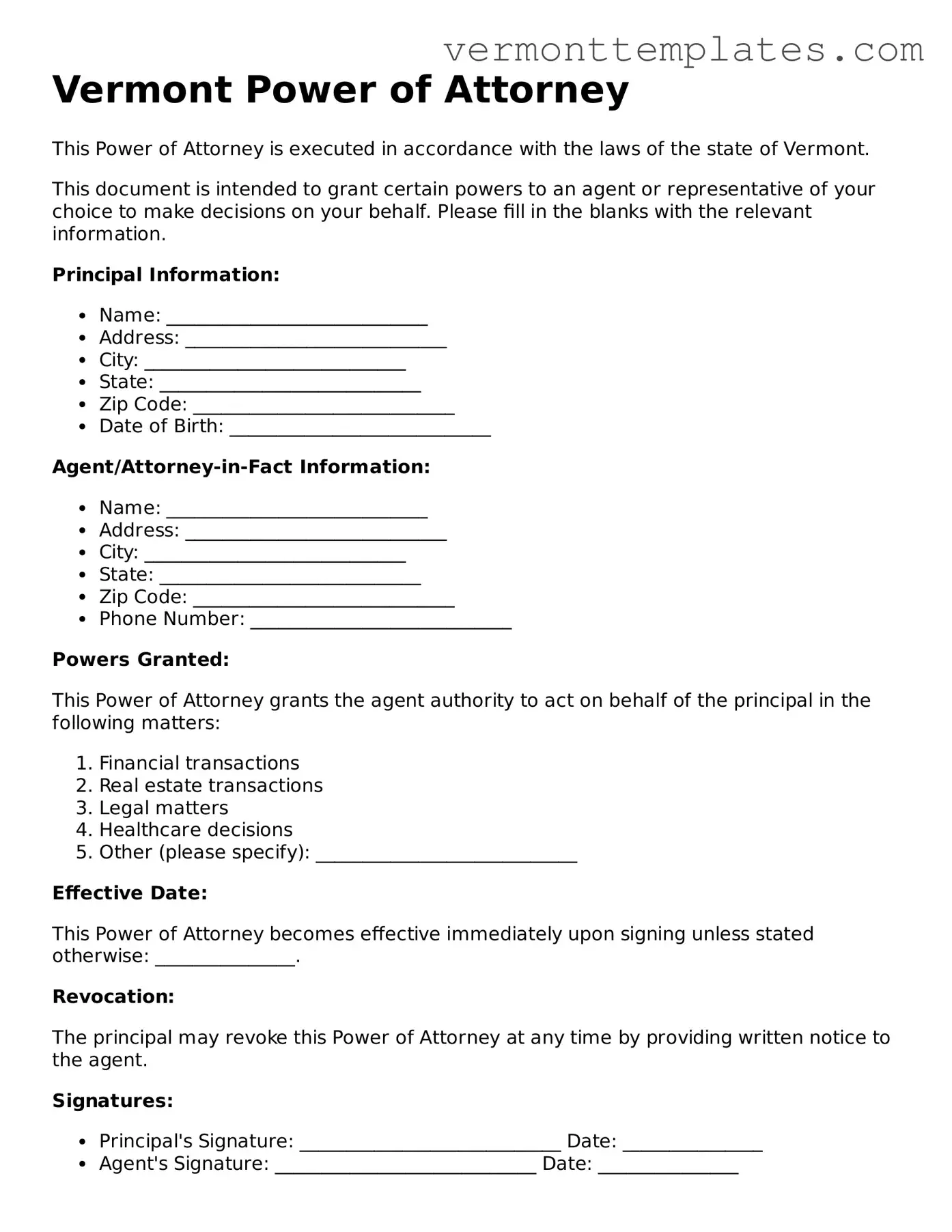The Vermont Power of Attorney form is similar to a Durable Power of Attorney. Both documents allow an individual to designate someone else to make decisions on their behalf. The key difference lies in durability; a Durable Power of Attorney remains effective even if the principal becomes incapacitated, while a standard Power of Attorney may not. This feature is crucial for long-term planning and ensures that someone can manage financial and legal matters when needed.
In addition to the various legal documents previously mentioned, individuals may also consider creating a General Power of Attorney form to oversee their financial affairs more effectively. This form empowers a designated agent to handle financial matters on the principal's behalf, ensuring that their interests are protected even during times of incapacity or absence. Such documents play a crucial role in comprehensive estate planning, providing peace of mind and security for one’s financial future.
Another similar document is the Medical Power of Attorney. This form specifically grants someone the authority to make medical decisions for you if you are unable to do so. While the Vermont Power of Attorney focuses on financial and legal matters, the Medical Power of Attorney is tailored to health-related decisions. Both documents empower a trusted individual to act in your best interest, but they serve distinct purposes in different areas of your life.
The Living Will is another important document that shares similarities with the Vermont Power of Attorney. A Living Will outlines your preferences regarding medical treatment and end-of-life care. While the Power of Attorney allows someone to make decisions on your behalf, the Living Will communicates your wishes directly. Together, they provide a comprehensive approach to managing your health care and legal affairs.
The Advance Directive is closely related to both the Living Will and the Medical Power of Attorney. It combines elements of both documents, allowing you to express your healthcare preferences while also appointing someone to make decisions for you. This holistic approach ensures that your wishes are respected and that a trusted person is in place to advocate for your care when you cannot speak for yourself.
A Healthcare Proxy is another document that serves a similar purpose to the Medical Power of Attorney. It designates an individual to make healthcare decisions on your behalf. While both documents grant decision-making authority, a Healthcare Proxy often focuses specifically on health-related matters, whereas the Vermont Power of Attorney encompasses broader financial and legal responsibilities.
The Revocable Trust, while primarily a financial document, shares some similarities with the Vermont Power of Attorney. A Revocable Trust allows you to manage your assets during your lifetime and dictate their distribution after your death. Both documents can help avoid probate and ensure that your wishes are carried out, but a Revocable Trust typically involves the transfer of assets into the trust, while a Power of Attorney is about delegation of authority.
The Guardianship document is also relevant when discussing similar legal instruments. While a Power of Attorney allows someone to act on your behalf, a Guardianship is a court-appointed role that takes effect when an individual is deemed incapacitated. This document provides a more formal structure for managing someone’s affairs, whereas a Power of Attorney is usually established through mutual agreement without court involvement.
The Conservatorship is akin to Guardianship, focusing on the management of an individual’s financial affairs when they cannot do so themselves. A court appoints a conservator to oversee assets and make financial decisions. Like Guardianship, this process is more formal and requires court approval, contrasting with the more flexible nature of a Power of Attorney.
Finally, the Bill of Rights for Residents of Long-Term Care Facilities can be seen as a complementary document. While it does not grant decision-making authority, it outlines the rights of individuals receiving care. Understanding these rights can empower individuals and their representatives to advocate for appropriate care, aligning with the intentions behind establishing a Power of Attorney.

